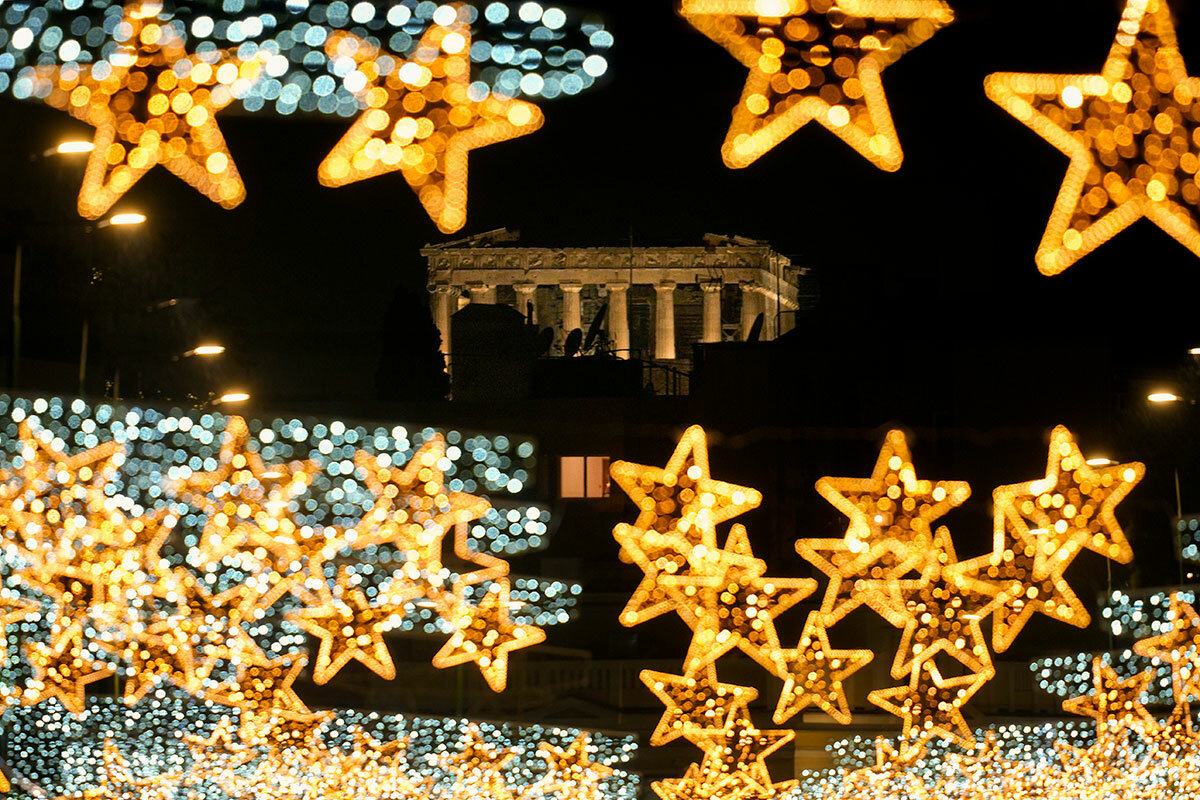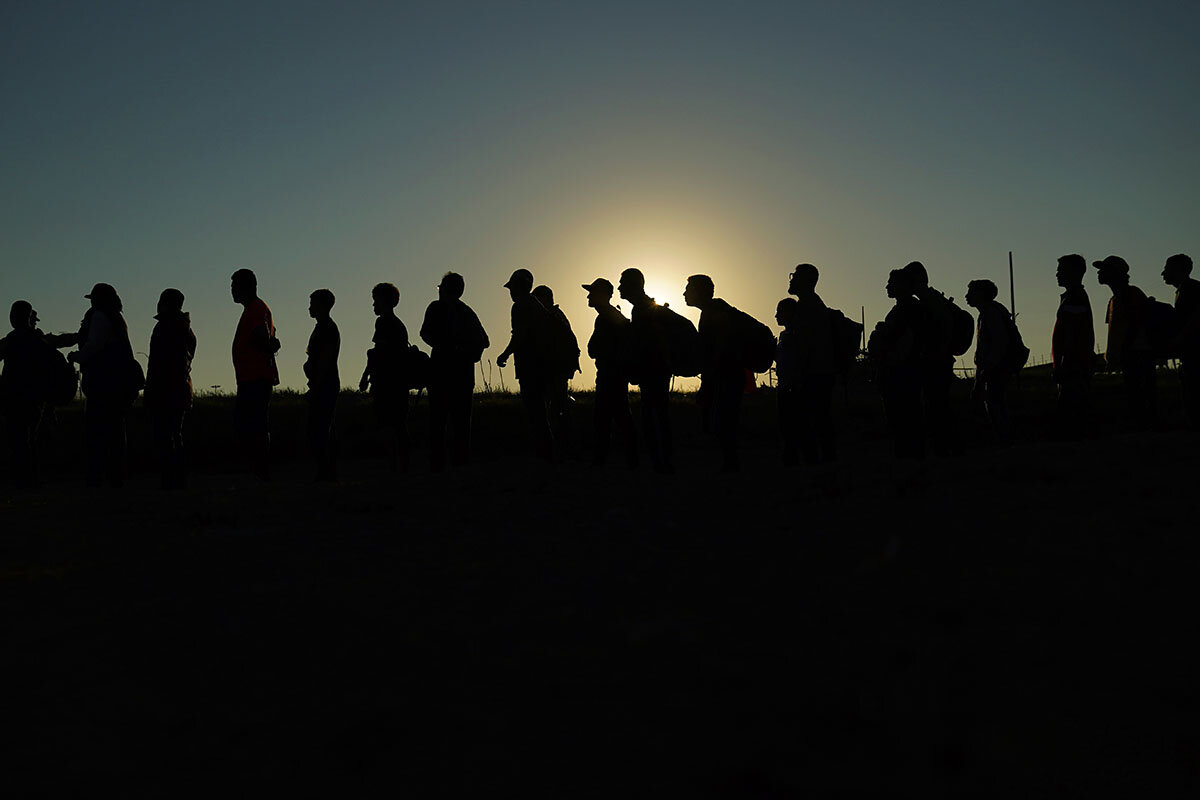Amid concerns about record encounters with migrants at the southern U.S. border, one of the most affected states is trying to take action on its own. But is that legal?

Why is Christian Science in our name?
Our name is about honesty. The Monitor is owned by The Christian Science Church, and we’ve always been transparent about that.
The Church publishes the Monitor because it sees good journalism as vital to progress in the world. Since 1908, we’ve aimed “to injure no man, but to bless all mankind,” as our founder, Mary Baker Eddy, put it.
Here, you’ll find award-winning journalism not driven by commercial influences – a news organization that takes seriously its mission to uplift the world by seeking solutions and finding reasons for credible hope.
Explore values journalism About usMonitor Daily Podcast
- Follow us:
- Apple Podcasts
- Spotify
- RSS Feed
- Download
 Mark Sappenfield
Mark Sappenfield
Thanks for ending your week – and your year – with us. The Monitor will be on holiday recess through Jan. 1, but we’ll be keeping in touch and stoking the hearth fire for you.
We’ll highlight our wonderful new holiday animation on Christmas Day. That’s a gift from essayist Murr Brewster and Jules Struck that’s become an annual tradition. After that, watch for daily specials that feature some of our best stories of 2023, grouped around themes including community and peace. Finally, on New Year’s Day, we’ll send you our favorite photos of 2023 collection, curated with care and love.
See you in 2024!
Already a subscriber? Log in
Help fund Monitor journalism for $11/ month
Monitor journalism changes lives because we open that too-small box that most people think they live in. We believe news can and should expand a sense of identity and possibility beyond narrow conventional expectations.
Our work isn't possible without your support.
Today’s stories
And why we wrote them
( 5 min. read )
( 6 min. read )
Arab nations, the United States, and the European Union are pushing for a “day-after” plan for Gaza. The challenges are significant. Overcoming them could be the difference between reconstruction and failure.
A deeper look
( 22 min. read )
What does home mean to you? The response to our call for vignettes about home was robust. This resulting collection is a tribute to love, comfort, and belonging. We hope these stories kindle the warmth of home in your heart.
Podcast

Covering the inventive Climate Generation
In the face of an unprecedented threat, one demographic group had the most to gain from action and the most to lose from complacency. That made it worthy of a multicontinent reporting project that spanned nearly a year. An editor and two writers take you inside the making of “The Climate Generation.”
The Young Hands on Earth’s Thermostat
( 5 min. read )
Even when geography, language, or customs differ, sometimes the strongest bonds transcend them, as our essayist discovers.
The Monitor's View
( 2 min. read )
The acoustics of warfare are as varied as the places where war is now being waged throughout the world – in deserts and forests, farmlands and city streets. Yet across these landscapes, there is one persistent and common sound.
Every day in Gaza, a small troupe of musicians moves from one makeshift camp of displaced people to another, gathering children within sheltering pockets of songs and poetry. “We use whatever means we can to remove the children from the war,” Ruaa Hassuna told Turkey’s Hürriyet Daily News. Her oud and voice, she says, drowns out the hum of drones overhead.
Similar stories emerge from wherever war is now being waged, from Ukraine to Sudan. They reflect a deep desire for a degree of dominion over conflict and repression, a reclaiming of agency through beauty.
Through music, Russian artists have risked arrest to express anti-war themes of empathy and remorse. For Ukrainians, music has offered a way to push back against Russian President Vladimir Putin’s claim that they have no distinct cultural or national identity. In Kyiv, subway stations have become subterranean concert halls where musicians in tuxedos perform Ukrainian folk songs.
“Alongside the many indelible images from the war in Ukraine, there have also been some powerful stories with a musical theme,” writes Janine Natalya Clark, a professor of gender, transitional justice, and international law at the University of Birmingham in England. They show that music “can be viewed as a creative expression of resilience and, relatedly, resistance.”
Musicians in Sudan have responded to a fierce civil war with new songs of peace that capture the “unyielding hospitality” of Sudanese culture, as the local rapper Bas told NPR. In the storied city of Timbuktu in Mali, where Islamist extremists restrict the movement of people and goods through intimidation, residents set aside their fears recently to hold a festival. Merchants shared ideas to promote female entrepreneurship during the day. In the evening, musicians played.
“It’s needed more than ever, because it’s something to help lift people’s spirits and it brings a lot of support to the local economy,” Salaha Maiga, an organizer, told the BBC this week.
Perhaps the most powerful musical instrument rising above the din is the unaccompanied human voice. Women in Iran who had been imprisoned for political reasons recall Narges Mohammadi – the winner of this year’s Nobel Peace Prize – still protesting repression by singing Persian classical music deep within Tehran’s infamous Evin Prison. During the early months of the war in Ukraine, a solo voice hushed a crowded bomb shelter. Amelia Anisovych, a 7-year-old girl, sang “Let It Go” from the Disney film “Frozen.” A video of her performance traveled around the globe.
“Without music ... how are we then supposed to reconcile?” Fatoumata Diawara, a Malian musician, asked in an interview with Bloomberg. Around the world, societies in war are writing songbooks of resilience, disarming hatred with chorales of innocence and peace.
A Christian Science Perspective
Each weekday, the Monitor includes one clearly labeled religious article offering spiritual insight on contemporary issues, including the news. The publication – in its various forms – is produced for anyone who cares about the progress of the human endeavor around the world and seeks news reported with compassion, intelligence, and an essentially constructive lens. For many, that caring has religious roots. For many, it does not. The Monitor has always embraced both audiences. The Monitor is owned by a church – The First Church of Christ, Scientist, in Boston – whose founder was concerned with both the state of the world and the quality of available news.
( 1 min. read )
God’s saving message of the all-pervading nature of divine goodness came clearly through Jesus and remains with us forever.
Viewfinder

A look ahead
Thank you for joining us today, this week, and this year. We hope you enjoy our special projects next week and have a wonderful holiday season. We will continue keep our homepage updated with wire service content on any news events. The Christian Science Monitor Daily will return on Tuesday, Jan. 2.








